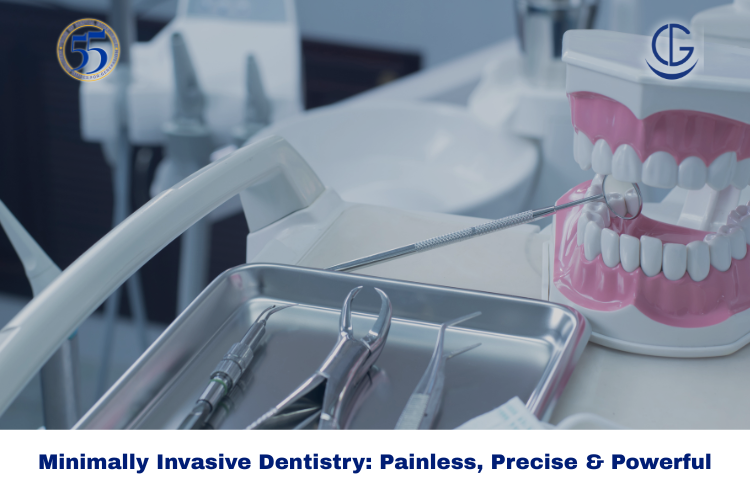Schedule Appointment



At Dr. Gowds Dental Hospital, we’re leading the way in minimally invasive dentistry, an innovative approach that focuses on preserving natural tooth structure with the least intervention. Using advanced techniques like laser dentistry, Air Abrasion, Digital Smile Design, and clear aligners, patients benefit from pain-free procedures, quicker recovery, and lasting results. Whether you’re looking to enhance your smile with teeth whitening or restore functionality with dental implants, minimal invasive dentistry offers precise, efficient solutions tailored to your needs.
Minimally invasive dentistry (MID) is a patient-centered philosophy that values early detection, prevention and conservative treatment. Whereas traditional dentistry often uses more invasive procedures or fixes rather than addressing the source of the problem, MID is designed to conserve as much of the healthy tooth structure as possible.
It was made possible through digital technology and tools, biocompatible materials work, and with precision tools that resolve dental problems with minimum trauma.
Here’s why patients are increasingly choosing minimal invasive dentistry:
Modern dentistry has seen incredible technological leaps. Some of the most impactful developments include:
Laser dentistry has been one of the most important developments to come along. Lasers are able to treat cavities and gum disease, and even perform procedures without using a scalpel or sutures.
Benefits:
Digital Smile Design lets patients preview their new smile using digital models. It enhances planning for veneers, clear aligners, and dental bonding.
Benefits:
Dental implants now benefit from digital mapping and 3D imaging, allowing for minimally invasive placement with high accuracy.
Benefits:
New materials used in dental bonding and sealants release fluoride and encourage enamel regeneration, aligning perfectly with the goals of minimal invasive dentistry.
There are many forms of minimal invasive dentistry, so consider some of your options – all aimed to restore health to your mouth without unnecessary discomfort.
Air Abrasion removes decay and prepares teeth for fillings or sealants by using a stream of fine particles, instead of a drill.
Best used for:
Advantages:
As noted earlier, laser dentistry is a great method for soft tissue and hard tissue, and serves many functions.
Typical Uses:
Sealants are applied to the grooves of molars where more cavities form. Sealants are a protective coating and work well on pre-school age children and adults who are prone to cavities.
What it does:
Clear aligners like Invisalign® are comfortable and discreet ways to straighten your teeth without metal braces.
Some benefits:
Professional whitening allows you to lighten your teeth using bleach agents in a controlled manner, with safer concentrations and protections in a clinical setting, so you can brighten your smile months or years before the enamel chips or shows signs of wear from eating your favorite foods or beverages.
Key Features:
Dental bonding uses tooth-color resin to fix minor imperfections such as gaps in teeth or chips.
Great for:
Veneers (no-prep veneers or minimal-prep) can be used to reshape and recolor teeth while leaving the underlying tooth structure intact.
Great for:
While minimal invasive dentistry provides excellent preventive and gentle alternatives for many dental problems, it is important to remember that not every dental problem can be handled minimally. Sometimes, patients still require more substantial treatment such as for severe decay, infection, or trauma.
At Dr. Gowds Dental Hospital, our well versed team does an interview and privileges minimally invasive dentistry techniques on a per patient bases with an emphasis on patient results. If you have a tooth problem, gum problem, or cosmetic problem, seek out a qualified dental professional regarding the problem as soon as possible.
Minimal invasive dentistry is changing the way we think about dental care. Today there are many techniques including but not limited to laser dentistry, Air abrasion, Digital Smile design, sealants, clear aligners, whitening, veneers, and dental bonding that patients can experience effective and safe aesthetic treatments without the fear or pain associated with dental treatment.
The future of dentistry lies in personalised, technology based, and preferred preserving teeth over extraction. If you are interested in improving your smile or addressing dental problems the gentle way, the staff at Dr. Gowds Dental Hospital are here to help every step of the way.
Take your first step toward a healthier smile.
Visit Dr. Gowds Dental Hospital or schedule a consultation today.
Minimal invasive dentistry focuses on preserving natural tooth structure using modern techniques like laser dentistry, Air Abrasion, and Digital Smile Design. It reduces discomfort, shortens recovery time, and avoids unnecessary drilling or cutting.
Yes, laser dentistry is a safe and highly effective method in minimal invasive dentistry. It allows for precise cavity removal without the need for traditional drills, making it more comfortable and less invasive for patients.
Absolutely! Clear aligners like Invisalign® are a key component of minimal invasive dentistry, offering a discreet and gentle way to straighten teeth without wires or brackets, preserving gum and enamel health.
Yes, both dental bonding and veneers—especially no-prep veneers—are part of minimal invasive dentistry. They improve the appearance of teeth with little to no removal of the natural tooth surface.
Preventive care in minimal invasive dentistry includes sealants, teeth whitening, and Air Abrasion for early decay removal. These techniques help maintain oral health while minimizing intervention and discomfort.